Let’s Talk Coffee® Rwanda brought together female farmers to empower them with new economic opportunities through trainings on the coffee value chain. With day one complete, we moved on the second day of the event which taught attendees about market access, coffee’s supply chain, and new opportunities for generating income.
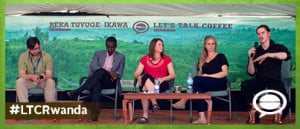 The day started with a panel discussion that I moderated, laying out the various parts of the supply chain. Though the women in attendance grow coffee, most have little knowledge of what happens to their coffee as it moves from seed to cup. Gilbert Gatali of KZ Noir gave a presentation about the role of the washing station and the exporter, while Christy Thorns of Allegro Coffee talked about her role as a coffee buyer for a national U.S. coffee brand and the ways she looks to connect to the communities from which the company sources. Jesse Durham of Sisters Coffee shared her experience as a co-owner of a family business roasting and retailing coffee in a small town in Oregon, and Brent Garcia from Nossa Familia Coffee completed the supply chain with a discussion about his role as a barista trainer.
The day started with a panel discussion that I moderated, laying out the various parts of the supply chain. Though the women in attendance grow coffee, most have little knowledge of what happens to their coffee as it moves from seed to cup. Gilbert Gatali of KZ Noir gave a presentation about the role of the washing station and the exporter, while Christy Thorns of Allegro Coffee talked about her role as a coffee buyer for a national U.S. coffee brand and the ways she looks to connect to the communities from which the company sources. Jesse Durham of Sisters Coffee shared her experience as a co-owner of a family business roasting and retailing coffee in a small town in Oregon, and Brent Garcia from Nossa Familia Coffee completed the supply chain with a discussion about his role as a barista trainer.
Following this was a panel titled “Envisioning Success,” featuring Esperance Bazavugye, leader of the Hinga Kawa Women’s Association of farmers; Jean Marie Kianey Bicamumakaba, president of the Abakundakawa cooperative; Jennifer Gallegos from Fair Trade USA; and Immy Kamarade of Dallas Investments Rwanda. Sustainable Harvest Rwanda’s Country Director, Esther Mukundane, moderated an inspiring and wide-ranging discussion about the success possible through strong partnerships.
The women then moved into focused training sessions including:
Coffee Tasting
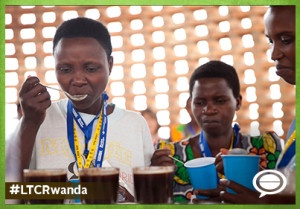 Sustainable Harvest’s® Olga Cuellar-Gomez led a tasting session of coffees from around the world. For the vast majority of the 80 female farmers in attendance, this was their first time ever tasting coffee. Olga prepared the women to experience the coffees’ flavors by first having them taste honey, local fruits, and chocolate. They then tasted coffees from Ethiopia, Brazil, Peru, and Colombia (grown by Aurora Izquierdo, a farmer and leader of the ASOANEI coffee cooperative). I found it truly inspiring to taste coffee with these women and take in their sophisticated descriptions of what they experienced. As the women completed their day and presented to the larger group about their experiences, one after another described how exciting it was to taste the results of their labor. The local culture is one in which coffee is not typically consumed—in fact, it is often demonized through stories of coffee leading to heart attacks, sleep loss and other negative side effects. The women’s better understanding and enjoyment of coffee bodes well for the ever-improving quality in Rwanda.
Sustainable Harvest’s® Olga Cuellar-Gomez led a tasting session of coffees from around the world. For the vast majority of the 80 female farmers in attendance, this was their first time ever tasting coffee. Olga prepared the women to experience the coffees’ flavors by first having them taste honey, local fruits, and chocolate. They then tasted coffees from Ethiopia, Brazil, Peru, and Colombia (grown by Aurora Izquierdo, a farmer and leader of the ASOANEI coffee cooperative). I found it truly inspiring to taste coffee with these women and take in their sophisticated descriptions of what they experienced. As the women completed their day and presented to the larger group about their experiences, one after another described how exciting it was to taste the results of their labor. The local culture is one in which coffee is not typically consumed—in fact, it is often demonized through stories of coffee leading to heart attacks, sleep loss and other negative side effects. The women’s better understanding and enjoyment of coffee bodes well for the ever-improving quality in Rwanda.
Coffee Roasting and Value-Added Steps
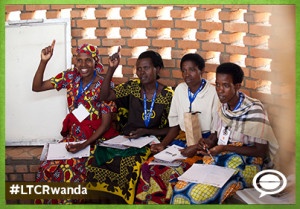 This is a session that I developed and taught alongside Jesse from Sisters Coffee. We started it by asking the participants if they recognized parchment, green, and roasted coffee. Only a handful had ever seen roasted coffee. Despite their limited access to coffee’s supply chain beyond the washing station where they deliver cherries, nearly all of the women knew how cherry became parchment and then green coffee. With a coffee roaster on-hand, we demonstrated how to roast a batch of coffee and discussed how this value-added step is necessary in turning the seeds of a coffee cherry into a beverage. The women were enthusiastic about crunching roasted coffee beans. Every group of women we taught asked how they could roast coffee at home, so Jesse led an impromptu discussion of roasting in a pan over a flame. Because most Rwandans roast peanuts this way, they quickly grasped the concept as it pertained to roasting coffee.
This is a session that I developed and taught alongside Jesse from Sisters Coffee. We started it by asking the participants if they recognized parchment, green, and roasted coffee. Only a handful had ever seen roasted coffee. Despite their limited access to coffee’s supply chain beyond the washing station where they deliver cherries, nearly all of the women knew how cherry became parchment and then green coffee. With a coffee roaster on-hand, we demonstrated how to roast a batch of coffee and discussed how this value-added step is necessary in turning the seeds of a coffee cherry into a beverage. The women were enthusiastic about crunching roasted coffee beans. Every group of women we taught asked how they could roast coffee at home, so Jesse led an impromptu discussion of roasting in a pan over a flame. Because most Rwandans roast peanuts this way, they quickly grasped the concept as it pertained to roasting coffee.
Best Practices in Coffee Harvesting
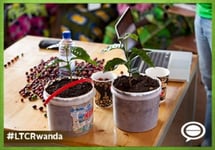 When I visited the Nyamping cooperative in November and talked with the members about their yield, it was clear they weren’t producing as many cherries as desired. At this session, Boss Farijallah and Albert Nzamwita taught women how to identify ripe cherries and how to manage the harvest on their farm to increase quality. During the session recap, the women reported that they could now better identify ripe cherries and were hopeful that it would lead to quality improvements.
When I visited the Nyamping cooperative in November and talked with the members about their yield, it was clear they weren’t producing as many cherries as desired. At this session, Boss Farijallah and Albert Nzamwita taught women how to identify ripe cherries and how to manage the harvest on their farm to increase quality. During the session recap, the women reported that they could now better identify ripe cherries and were hopeful that it would lead to quality improvements.
Organic Fertilizer
The women learned how to create their own organic fertilizer. Given the remoteness of many of these farms, having an option for homemade organic soil inputs saves money on fertilizer and provides women with access to soil nutrients during times of the year when they may not have access to conventional fertilizer.
Beekeeping and Honey Production Systems
In addition to improving the overall health of the ecosystem, honey production is an accessible way for coffee farmers to generate additional income. Master beekeeper Marie Claire Nuyirangirimana taught women the role of bees in pollination and gave them a chance to taste and learn about harvesting honey.
Mushroom Production
Kigali Farms led this presentation, introducing participants to opportunities to tap into the mushroom supply chain to increase their wealth, and also focusing on mushrooms as a healthy alternative to meat.
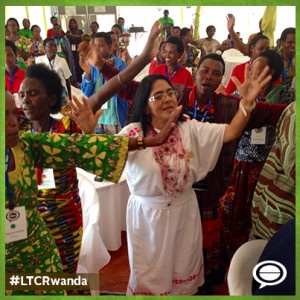 As we wrapped up the training sessions, the women gathered and recapped all they had learned during the past two days. It was encouraging to hear so many of the women say that they now felt like they were part of the larger global community of coffee farmers.
As we wrapped up the training sessions, the women gathered and recapped all they had learned during the past two days. It was encouraging to hear so many of the women say that they now felt like they were part of the larger global community of coffee farmers.
It was a gratifying week for all involved, and I have to recognize the amazing team that put so much work into making this event a success. With more than 160 attendees, Let’s Talk Coffee® Rwanda was by far the biggest regional event we have produced, and it even rivaled the first few years of our global event. Let's Talk Coffee® is a huge undertaking, and I'm so proud to work with a team that recognizes that everyone's hard work is integral to creating a successful event.



.png)
